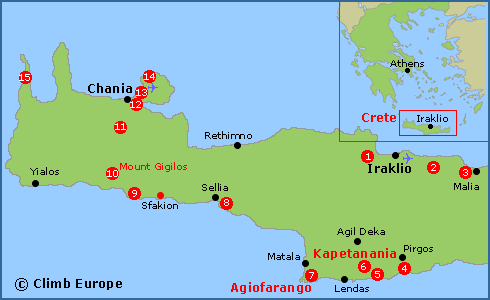Rock Climbing on the island of Crete
Sport climbing on the Greek island of Crete is relatively new (and therefore relatively undeveloped) when compared to the rest of Europe. The main rock climbing areas in Crete are shown on the map below, with Kapetaniana and Agiofarango in the south of the island being the largest and most developed.
Map of the main rock climbing areas in Crete

| No | Crag Name | Grade Range | Total No of Routes | Single or multi-pitch | Which Guidebook |
|---|---|---|---|---|---|
| 1 | Voulismeno Aloni | 4c to 8c | 44 | Single | None |
| 2 | Skoteino | 5b to 8b+ | 15 | Single | Crete North to South |
| 3 | Malia | 6a to 8a | 12 | Single | Crete North to South |
| 4 | Treis Ekklisies | 4c to 7c+ | 29 | Single | Crete North to South |
| 5 | Agios Ioannis | 4c to 6c+ | 28 | Both | Crete North to South |
| 6 | Kapetanania | 3b to 8a | 136 | Both | Kapetanania |
| 7 | Agiofarango | 4c to 8a | 105 | Both | Crete North to South |
| 8 | Plakias | 4c to 8a | 42 | Both | Crete North to South |
| 9 | Marmara | 5c to 6b+ | 5 | Single | None |
| 10 | Mount Gigilos | VI to VIII+ | 27 | Multi-pitch | None |
| 11 | Theriso | 5b to 8a | 44 | Both | None |
| 12 | Monte Vardia | 5a to 7a+ | 58 | Single | None |
| 13 | Kalathas | 5b to 7a+ | 46 | Single | None |
| 14 | Stavros | 5b to 6b+ | 8 | Multi-pitch | None |
| 15 | Tersanas Cave | 6c+ to 8b | 20 | Single | None |
This information has been extracted from the various rock climbing guidebooks that cover Crete. These are; Crete from North to South Guidebook; Kapetaniana Guidebook; and the Greece Sport Climbing Guidebook. All of these guidebooks can be bought from our shop. The table shows which guidebook covers which crag.
Kapetaniana is the best rock climbing area in Crete. The rock climbing is based around the isolated village of Kapetaniana, and therefore offers remote and peaceful rock climbing. However it is only 75Km from the capital Iraklio (Heraklion), with its airport, and therefore is very accessible. There are 6 areas offering single pitch sports routes from 15 to 40m long, plus a small amount of traditional climbing on Mount Kofinas. It total at Kapetaniana there are over 130 routes across a wide range of grades on solid white limestone rock.
Agiofarango is situated within a picturesque gorge that runs down to the sea and a pretty beach and offers a great sports climbing venue. The climbing is situated on both sides of the gorge, which means that you can find sun or shade no matter what the season or time of the day. The routes are generally long and cover all styles from slabs, overhangs, steep walls, chimneys and cracks, across a wide range of grades.
Around Chania the main sport climbing areas are at Kalathas, Monte Vardia, Stavros, and Theriso. The vast majority of these routes are single pitch, though there are some multi-pitch routes around 100m long.
The best rock climbing area in Crete for long big wall routes is at Mount Gigilos, which is close to the famous Samaria Gorge National Park. The routes here range from 600m to 1,500m long, and are generally trad routes (that require the placing of nuts and cams) that demand a mountaineering approach.
Marmara is situated at the end of the Aradena gorge near Loutro. Here the climbing is straight off the beach plus there are great possibilities for opening new long sports routes. Around Sfakion there are also some deep water soloing (DWS) opportunities.
Tersanas Cave is situated next to the sea and is full of large stalactites. There are enormous possibilities for new routes here. However it is definitely a place for the harder climber with the routes ranging from 6c+ to 8b.
The Crete North to South guidebook describes the rock climbing found at Agiofarango, Plakias, Agios Ioannis, Treis Ekklisies, Skoteino and Malia.